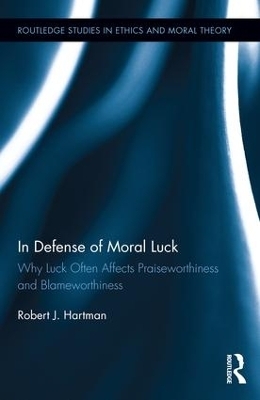
In Defense of Moral Luck
Why Luck Often Affects Praiseworthiness and Blameworthiness
Seiten
2017
Routledge (Verlag)
978-1-138-29344-1 (ISBN)
Routledge (Verlag)
978-1-138-29344-1 (ISBN)
The problem of moral luck is that there is a contradiction in our common sense ideas about moral responsibility. In one strand of our thinking, we believe that a person can become more blameworthy by luck. For example, two reckless drivers manage their vehicles in the same way, and one but not the other kills a pedestrian. We blame the killer driver more than the merely reckless driver, because we believe that the killer driver is more blameworthy. Nevertheless, this idea contradicts another feature of our thinking captured in this moral principle: A person’s blameworthiness cannot be affected by that which is not within her control. Thus, our ordinary thinking about moral responsibility implies that the drivers are and are not equally blameworthy.
In Defense of Moral Luck aims to make progress in resolving this contradiction. Hartman defends the claim that certain kinds of luck in results, circumstance, and character can partially determine the degree of a person’s blameworthiness. He also explains why there is a puzzle in our thinking about moral responsibility in the first place if luck often affects a person’s praiseworthiness and blameworthiness. Furthermore, the book’s methodology provides a unique way to advance the moral luck debate with arguments from diverse areas in philosophy that do not bottom out in standard pro-moral luck intuitions.
In Defense of Moral Luck aims to make progress in resolving this contradiction. Hartman defends the claim that certain kinds of luck in results, circumstance, and character can partially determine the degree of a person’s blameworthiness. He also explains why there is a puzzle in our thinking about moral responsibility in the first place if luck often affects a person’s praiseworthiness and blameworthiness. Furthermore, the book’s methodology provides a unique way to advance the moral luck debate with arguments from diverse areas in philosophy that do not bottom out in standard pro-moral luck intuitions.
Robert J. Hartman received his Ph.D. in Philosophy from St. Louis University in 2016 and is currently a postdoctoral research fellow with the Gothenburg Responsibility Project at the University of Gothenburg. His main interests include moral responsibility, ethics, metaphysics, and philosophy of religion. His research has been published or is forthcoming in Philosophical Studies, Philosophia, and the Journal of Philosophical Research.
1. Introducing the Problem of Moral Luck
2. The Concept of Moral Luck
3. Against the Skeptical Denial of Moral Luck
4. Against the Non-Skeptical Denial of Moral Luck
5. In Defense of Moral Luck
6. Error Theory for the Luck-Free Intuition
| Erscheinungsdatum | 12.07.2017 |
|---|---|
| Reihe/Serie | Routledge Studies in Ethics and Moral Theory |
| Verlagsort | London |
| Sprache | englisch |
| Maße | 152 x 229 mm |
| Gewicht | 362 g |
| Themenwelt | Geisteswissenschaften ► Philosophie ► Erkenntnistheorie / Wissenschaftstheorie |
| Geisteswissenschaften ► Philosophie ► Ethik | |
| Geisteswissenschaften ► Philosophie ► Metaphysik / Ontologie | |
| Geisteswissenschaften ► Philosophie ► Philosophie des Mittelalters | |
| Recht / Steuern ► EU / Internationales Recht | |
| ISBN-10 | 1-138-29344-X / 113829344X |
| ISBN-13 | 978-1-138-29344-1 / 9781138293441 |
| Zustand | Neuware |
| Haben Sie eine Frage zum Produkt? |
Mehr entdecken
aus dem Bereich
aus dem Bereich
die Grundlegung der modernen Philosophie
Buch | Softcover (2023)
C.H.Beck (Verlag)
CHF 25,20
Buch | Softcover (2023)
Reclam, Philipp (Verlag)
CHF 9,80


![Was heißt Denken?. Vorlesung Wintersemester 1951/52. [Was bedeutet das alles?] - Martin Heidegger](/media/113619842)